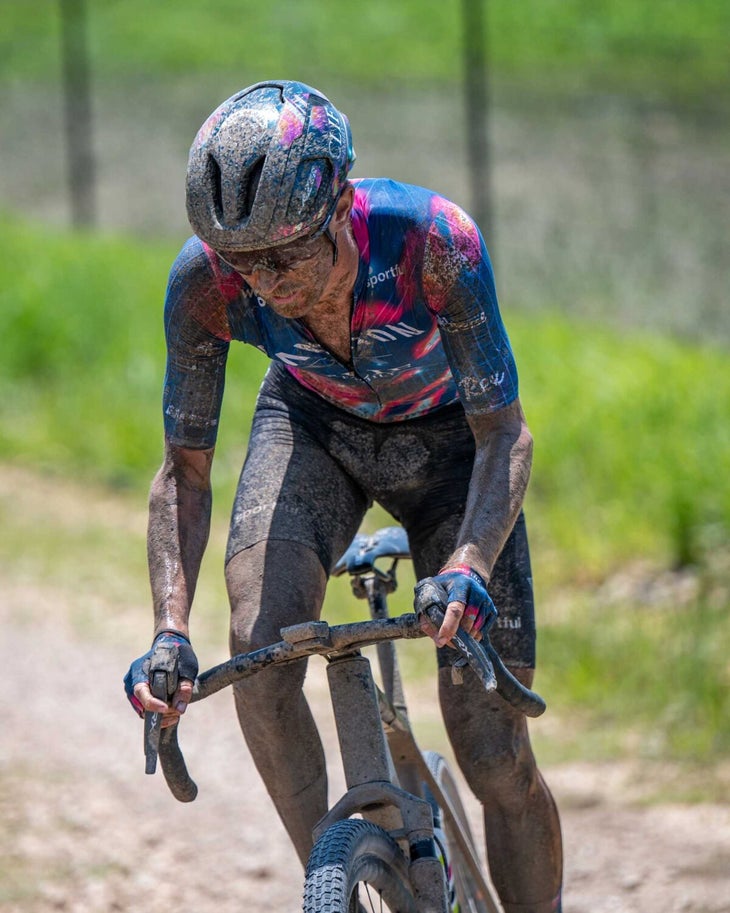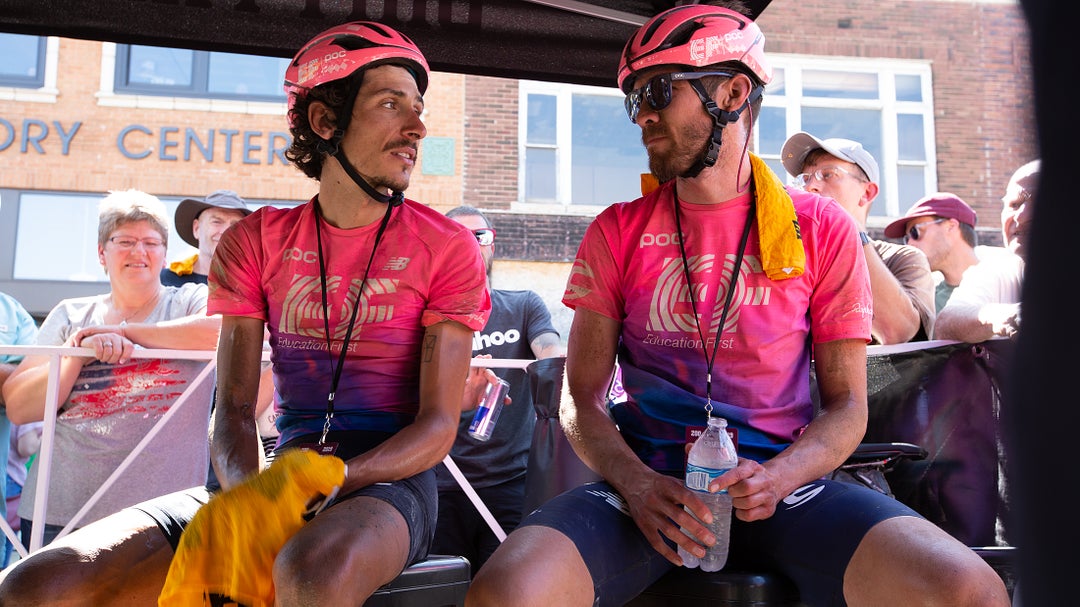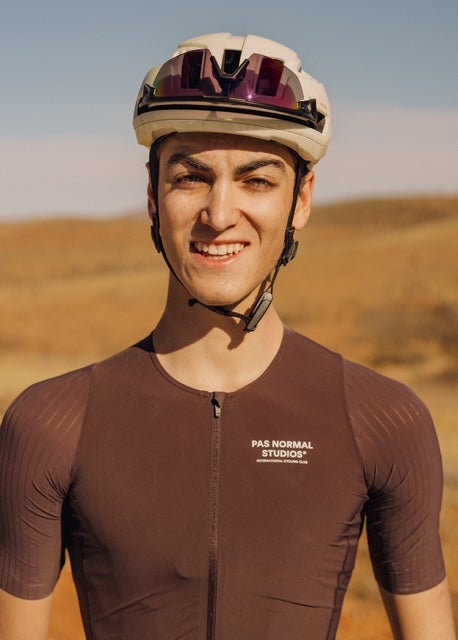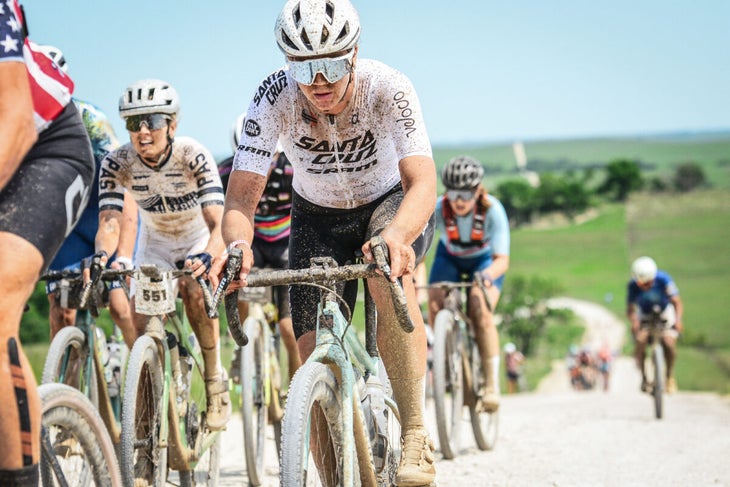“Even in 2019 when it was just the EF boys and myself coming to do it, it was still a bike race,” Pete Stetina told Velo on Sunday after his sixth Unbound 200. “I was here to experience this thing, this gravel everyone was talking about, but it’s still a race you put a number on for and you want to win.”
Stetina was an early mover in the gravel game and over the years has tracked the race as it has risen to the pinnacle of a global sport.
“The goal has always been to perform 100% and do what you can with the tools and knowledge at your disposal, I just think it’s been such an evolution that you know the sport has gone beyond that and now it’s a career defining race with the capacity to launch your career,” he said.
“It’s the WorldTour I left at this point, I mean it’s even Keegan (Swenson) said in a podcast that he’s at altitude training camp, I mean that it’s that same professional sport effort.”
By his own standards, Stetina had a mediocre race last Saturday. A mechanical bounced him from the front of the action in the middle of the race before he used his strength and experience to ride himself back into 20th by the end of the day.

For a rider who has fought for podiums in past editions, the result is a dip, but in the context of the new normal, Stetina was good enough to be the fourth American on the standings. Two years ago, finishing as the fourth American put him in seventh. Two years prior to that in 2021, four of the top five were American.
“I left the WorldTour for this fresh breath and it does feel like I’ve been pulled back into those five-star races to the performance only side of things and I’ve had to consciously decide how I want to experience being a professional cyclist in that way,” Stentina said, reflecting on how he’s navigated this trajectory.
“I’ve done it by having a deeper variety of races than some of my peers on the events I attend because there’s some events where I can go that are experiencing a new place that are maybe off the beaten track that have the promise of a new geography or new community and when I can fill my cup in terms of the the good vibes. Then I know that come time for Unbound I can flip the switch back to you know knives-out for results only because that’s what it takes.
“Filling one cup so that I can be okay at peace with the fact that I can’t always do happy hour anymore.”
While Stetina has come into his veteran status along with gravel’s maturity, young riders are coming into the Unbound experience with the baked-in understanding that it is the biggest professional cycling event in the United States. It isn’t hipster, as it was when Stetina, Lachlan Morton, and Alex Howes took on the challenge as WorldTour riders in 2019, experimenting with racing in the Kansas prairie.

For young riders, like Ollie Rutberg who is an 18-year old on the well-funded PAS Normal gravel development team, Unbound is the biggest stage to build a career across the cycling spectrum.
“There’s so many different directions to go from here,” Rutberg said the day after the race. “And now I get to race against all these big names and get to prove myself and you can come into it and not have a whole lot of experience and just have some really great opportunities to learn, which is super cool.”
Rutberg is competing in the U23 Life Time Grand Prix. This is the first year of the series which gives development riders a chance at delving into the world of gravel racing without having to square up against the biggest names in the sport. At Unbound, for instance, the U23 riders raced the 100-mile distance instead of the marquee 200-mile race.
“At 18 years old, I was sort of glad that we didn’t do the 200,” Rutberg said. “I could do it, but it would be more of a survival race, was what we had talked about with my dad and with my coach. It’d be more of a survival race because I don’t have that engine just yet to really perform for 200 miles.
“I was in the group, I was messing with breakaways and pulling along and taking my poles and all the rest of it, and was really focused on the race for the 100 miles. And I was in it, and I don’t think I would have really been in the race for the 200.”

Ultimately, what brings young riders to this race and to the U23 Life Time Grand Prix is the promise of a professional career, a target that is becoming more attainable in gravel, and less attainable in the other more established genres of cycling in the United States. At Unbound, in particular, success in the highest level of these events is a golden ticket.
“I am motivated for this race because it’s an internal desire and enjoyment of racing, but if I win Unbound, my career doesn’t change at this point,” Stentina said of the importance of Unbound. “I’ve had this established gravel career and good sponsorships with good companies and nothing will change. It would be a nice checkbox on a résumé and that’s the same with Boswell and even Keegan — his career is not gonna change if he wins unbound again — but for Cam Jones, a 24 year-old Kiwi with minimal support, his career is never gonna be the same after yesterday.
“That was a night and day moment in time for his life, and that, for a young rider, has the potential to define careers for years to come.”
Nevertheless, Cam Jones is more of an anomaly thus far in the story of the men’s race at Unbound. So far in the modern era the race has been predominantly won by established names of other disciplines, or at the very least a professional rider with established credentials.
The women’s race, however, is a more fertile ground for breakthroughs. For the U23 women category, Unbound is perhaps a bit more attainable of a goal, even if the payout is the same. This has meant that some very talented young women have made the jump to gravel even with windows of opportunity open elsewhere.
“I raced mountain bikes for like seven years, then I raced on the road for a year and I kind of was trying to figure out like where I wanted to go next,” Ruth Holcomb told Velo. Holcomb was the winner of the U23 race and rides for the Santa Cruz Ht Squd, Keegan Swenson’s team of privateers.
“Randomly, I got connected with Ht Squd and they were looking for another girl for their team and I said I’d love to do some endurance mountain bike racing and gravel comes along with that so it ended up being like this great opportunity.”
With a calendar that includes the big stops along the Life Time Grand Prix along with other top events like the Whiskey Off-Road and SBT GRVL, an invitation to the team was a massive opportunity for the multidisciplinary cyclist.
“They each kind of have their own thing to like help me with,” she said. “It’s been really nice having Alexis like having another woman to kind of talking through women’s races and then Keegan and Tobin are both so smart and like I’ve learned just so many things from them like just little tips and tricks.
“They’ve been so awesome in helping me meet people, connect with sponsors and it’s interesting being on a team where these are some of the best gravel racers out there because there’s definitely some pressure there and it’s daunting at times, but they’ve been nothing but supportive.”
Ultimately, winning the women’s U23 race wasn’t a massive career-defining result for Holcomb. What it was, though, was a confirmation that the gravel path could be the ticket for the young rider.

“It’s just pretty impressive how hard you train for this kind of stuff and how hard the racing is,” she said. “Coming into it I didn’t really know the style of racing and a lot of time racing on the road is kind of like a waiting game and then you’re very strategic and then XC mountain is full gas but it’s only an hour and a half.
“It’s been really cool to be a part of and this is the first time that I’m able to go to school and race my bike and not have to have a job and I’m still making money so it’s been really nice to be able to do all that and see the balance.
“It has opened a lot of new horizons for me. I don’t feel like I have to give up everything that I’m doing in the US and move to Europe and be a World Cup XCO racer — there are other things out there that are available to me as a racer.”
From Stetina’s veteran perspective, this notion of new horizons for new athletes is the biggest boon that has come from the gravel scene. It is no longer the landscape he was raised in where riders filed down the road path or the cross country mountain biking track. Within that dynamic landscape, riders can thrive and come into their own lane of professionalism.
Yet, it is a delicate balance.
“There’s avenues open for all those other disciplines and so you have to listen to your heart and decide where you want to pursue,” Stetina said. “It’s clear that gravel is its own elite discipline now with riders specializing in and making good financial careers off of it, but that means you can’t just drop into it. I would say young riders need to really consciously think of where they wanna end up, if that’s road or mountain bike or gravel, and really pursue those pathways.”
The 100-mile U23 categories are a good start, says Stetina, but if riders like Rutberg and Holcomb are to make it — whatever that means — the challenge will be figuring out how to parlay that into what’s next in a sport that’s future still seems so undefined, especially from a competitive perspective.
“It was really cool to see what happened with the Unbound 100 this year and I think it was good… to see potential because it’s hard as an under 23, who might not have the endurance or the developed engine yet, to go up against Ian [Boswell], Keegan [Swenson], or Matt Beers, and showcase what they can do,” Stetina said.
“I do think riders get a little lost in the whole content thing, if we’re talking about gravel racing. It’s important to have a voice, and in gravel, the magic recipe is that personality still matters a lot in the sport, but to be successful you need the results too. Results people notice you and then the personality can start to shine.
“You still need to do the results and then people will care about personality, highlight reels, and all of that.”
With racing this good, Stentina argues, the story can only go as far as the limits of the racing. Unbound, and the stories of Cam Jones and Rosa Kloser, have shown that is still true.
Correction: This story has been updated to fix a typo in Ollie Rutberg’s name.
